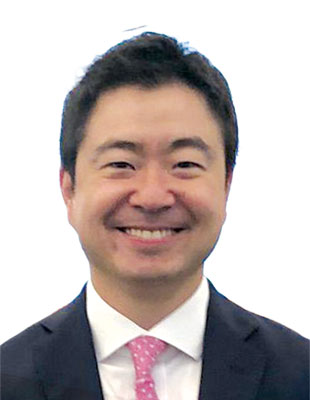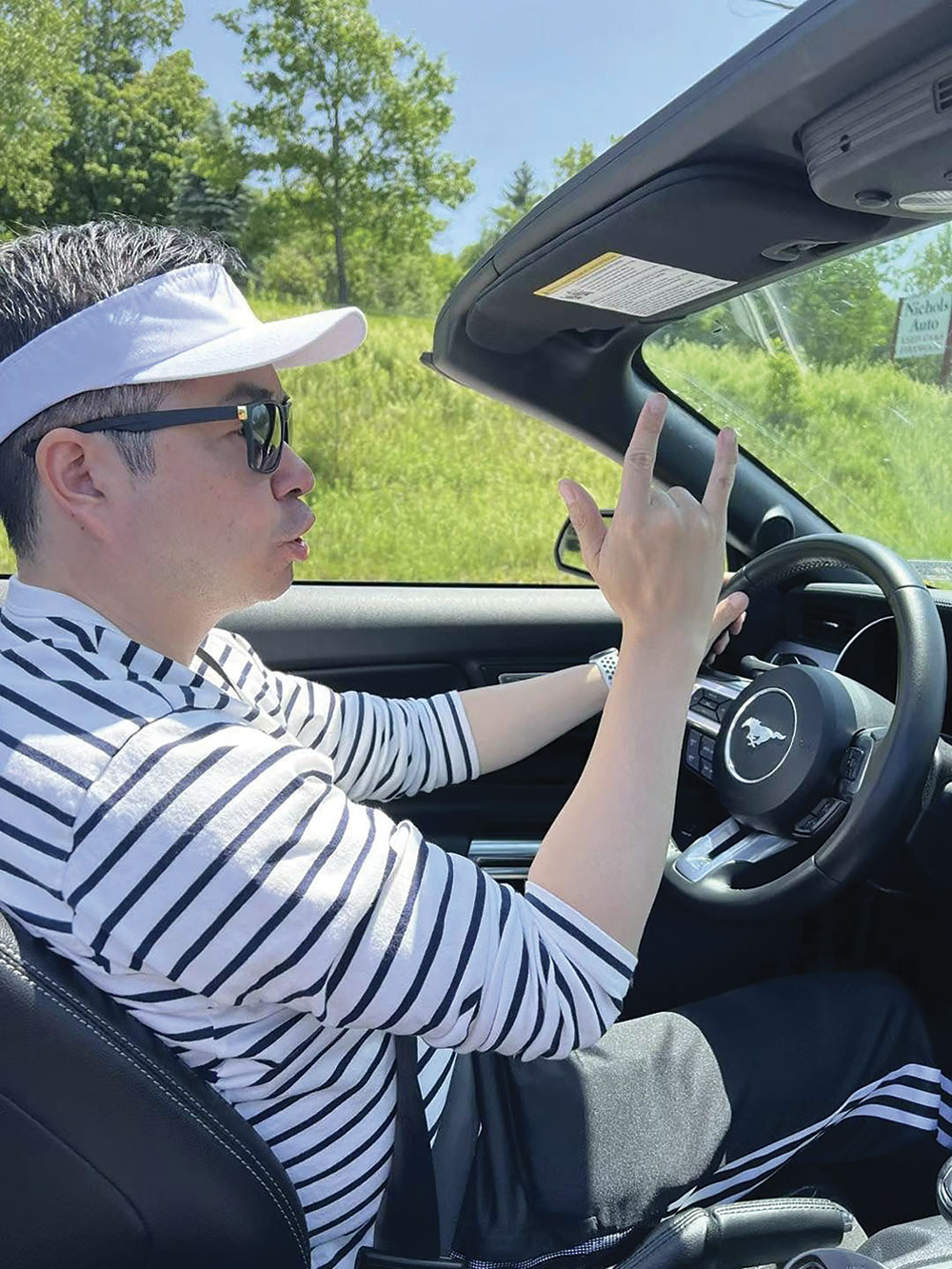I was born in Hong Kong and went to Munsang College
in Kowloon City from kindergarten to primary six. So
basically, a pretty good local school, a Christian school.
I'm not an academic achiever or anything like that, just a
B grade kind of person.
My grandfather was from Shanghai and moved to Hong
Kong in the 1950s. He opened up a printing company
in Kwun Tong, Hong Kong, and printed Bibles. He
translated the English Bible into different languages:
Thai, Korean and Chinese.
My family is hardworking, they save money. You know,
the older generation, like my grandma, never spent
money. She would save a lot of money and then go to
McDonald's. She would eat a burger and then if she
couldn't finish it, would save half and bring it home for
supper. So, thrifty kind of people.
Off to America
At the age of 12, I moved to Canada for 2 years and
then to the US, Boston, with my mom, so I spent Grade
9 to Grade 12 there at a public school, Lexington High
School. And then I applied for university and got into
Brandeis University, a Jewish heritage university. I grew
up with a lot of Jewish friends.
I graduated from Brandeis with a bachelor's degree.
Economics is sort of like thinking skills and analysing
current events using economic models. To be honest,
when I graduated in 1997, I really didn't know what I
was going to do. I had no clue. I had interned at Merrill
Lynch Boston or Morgan Stanley Boston during the
summers. I was just a kid, right? I made cold calls to
clients. You know, look up the phone book: "Is that
Mr Rosenberg? Living in Upper East Boston?" "Yes, it's
Rosenberg. I'm busy right now." And then the line cuts.
Cold calling is just like that guy Bud Fox in Wall Street (a
1987 film). I was like the Asian version of Bud Fox. Just
not as smart as him.
Career start in Hong Kong
Then, after college I came back to Hong Kong because
a lot of my family members were here, and I applied
for jobs. Again, I didn't know what to do. I applied
through the South China Morning Post classified, on
Saturday. Oh, they were hiring auditors, junior auditors,
at a CPA firm. So, I sent my CV there and this guy, this
local accountant gave me a call: "Hey, can you speak
Chinese?" Yes. "Never heard of your university but we'll
give it a try." At that time the economy was pretty good,
so it was hard for them to hire. A local firm, right. "So,
I'm going to only pay you 6,000 Hong Kong dollars a month." OK. I'm going to take this job. "You know
accounting, right? So, you can do the bookkeeping for
some of the smaller clients in Hong Kong and China."
OK, fine, just number crunching.
So, he taught me how to use Quick Notes or something
like that. And then sometimes at payday, the dude
would disappear, and all the staff were like, "Hey, what's
going on with the boss? It's payday, right?" And after 5
days people were saying, "We have to call the Bureau
to force him to pay us." It was bizarre. But after a week,
he would be back in the office: "I'm sorry, guys. I just
returned from China, and now I'm gonna pay you guys
with a cheque." So, I didn't want to work for him for
the rest of my life. He wasn't that trustworthy, right?
I didn't have a family to feed yet, but I still needed to
watch a movie.
Junior accountant
After half a year, I went back to the South China
Morning Post and there's a CPA firm, Deloitte, and it's
hiring a junior accountant. I applied. They interviewed
me 3 times: "OK, so you have experience at a local CPA
firm, right?" Yeah. "You know, how to do bookkeeping,
double entry and stuff?" OK. "Can you speak
Mandarin?" A little bit, yeah. OK. "Cantonese?" OK.
"English?" Yeah, fluent English, pretty native. "OK, I'll
hire you." And then I joined Deloitte for 2 years, basically
doing auditing. They had a totally proprietary system
for auditing companies. So, I learnt about that in the
first year. Did a lot of photocopying for the managers. I
bought them coffee. You know, whatever they want you
to do, you have to do it. Yeah, so I was a sort of rolled
up sleeves kind of guy serving them.
Research analyst
Then, after 2 years of that, I switched to being a research
analyst at an investment bank. UBS hired me as a junior
research assistant. I started doing financial modelling
for the senior analyst. My senior was a research analyst
in the banking sector. So, he's like, "Heh George, this is
the annual report for the bank for the past three years.
Crunch those numbers, put them into Excel for me."
Number crunching, last year and this year, the revenue
difference, the profit difference, that balance sheet
P&L, depreciation, cash flow. And he did the analysis
to produce his research report. I did that for roughly 5
years, and then I became an investment banker myself.
And now I've been doing that in the financial markets
for 24 years, in Hong Kong, China, right now in Canada.
Investment banker
Going into China, a lot of companies needed to raise
capital from 2000 to 2018. From the year 2000,
China had just entered the WTO. The companies were
extremely poor, but they were growing. They needed
capital. They needed money. They needed US dollars.
During that time, China Construction Bank, Bank of
China, and a lot more all did their IPOs in the Hang Seng
market.
We flew to Beijing and we would pitch our investment.
Could we help raise $10 billion through international
investors in Hong Kong, in London, in the US to
subscribe to their IPO? So, I'm the kind of guy who
goes to China and gives them the confidence that
they could raise the money. And I would need to liaise
with the fund managers in the US, in London, in Hong
Kong, in Singapore, and create the confidence that this
company is indeed a great buy, that they're going to
make a lot of money at this valuation. Because of my
analyst background I could produce reports, I knew the
companies inside out, and I could pitch my idea to the
fund managers so that they would fully subscribe to the IPOs. Really, it's an art of striking a balance so that both
parties are happy.
I've been all over the place because investment banking
is a volatile environment. You have ups and downs. Right
now, I have just been speaking to my ex-colleagues and
half of the investment bankers are laid off in Hong Kong.
I would say only 50% survive. The rest are at home right
now, watching TV.
At that time, it was lucky for me because in the year
2000, people were just starting to look at the China
market from an international investor standpoint. So,
we were the ones who convinced the fund managers
in the UK and US to subscribe to those IPOs so that the
Chinese firms would have the money to expand. So
yeah, basically I'm not smart or anything. I was just in
the right spot at the right time.
A typical working day
I mainly work from home, so have to make sure that
the internet system is running, because we run a lot
of different software — Bloomberg, FactSet, analysing stocks, real-time quotes, the execution software, clients'
CRMs, clients calling in. Procedures, making sure that all
our trade execution is complying with the compliance
department so that they won't give us a hard time is
really important. We use Zoom, real-time Google Meet
or something like that, because after the pandemic
everyone is working from home, right? So basically,
you'll go to the office once or twice a month.
Life in Canada
It's really multinational. Ethnically, we may be Indians,
Pakistanis, Chinese, etc., but we're all Canadians,
multicultural and yeah, we laugh at each other, but
we're buddies. We work with each other. We make
jokes and people are not offended. Yes, it's diverse
and inclusive and I think the Canadian culture is sort of
down-to-earth. People are friendly, people are easygoing.
Maybe because Canadians are not as competitive
as, say, their US counterparts. I mean, we don't need to
win everything. We just want an easy life — BBQ with
the kids, driving around to the beach, camping, hiking...
We enjoy the simple life. It's free. We eat hot dogs and
burgers and of course we drink beer. But beer costs,
what, $3.99? We Canadians play hockey, eat doughnuts and drink coffee with a lot of sugar. And we're not so
fast. We just like the way we are. That's Canada.
Advice for aspiring investment traders
Okay. You must love to learn new things. The
world is changing daily, every second. Economics,
political situations, technology, interest rates and
human preferences on trans fashion. You have to
have a general idea of how the world works as an
ecosystem. To come up with the original idea. To
have a clear mind and discipline. Read as much as
you can daily and form your own opinion that's
different from the market. And to
make money, have the courage to
go against the tide.


